Suk-in Chang. Modern Conversational Korean
Подождите немного. Документ загружается.

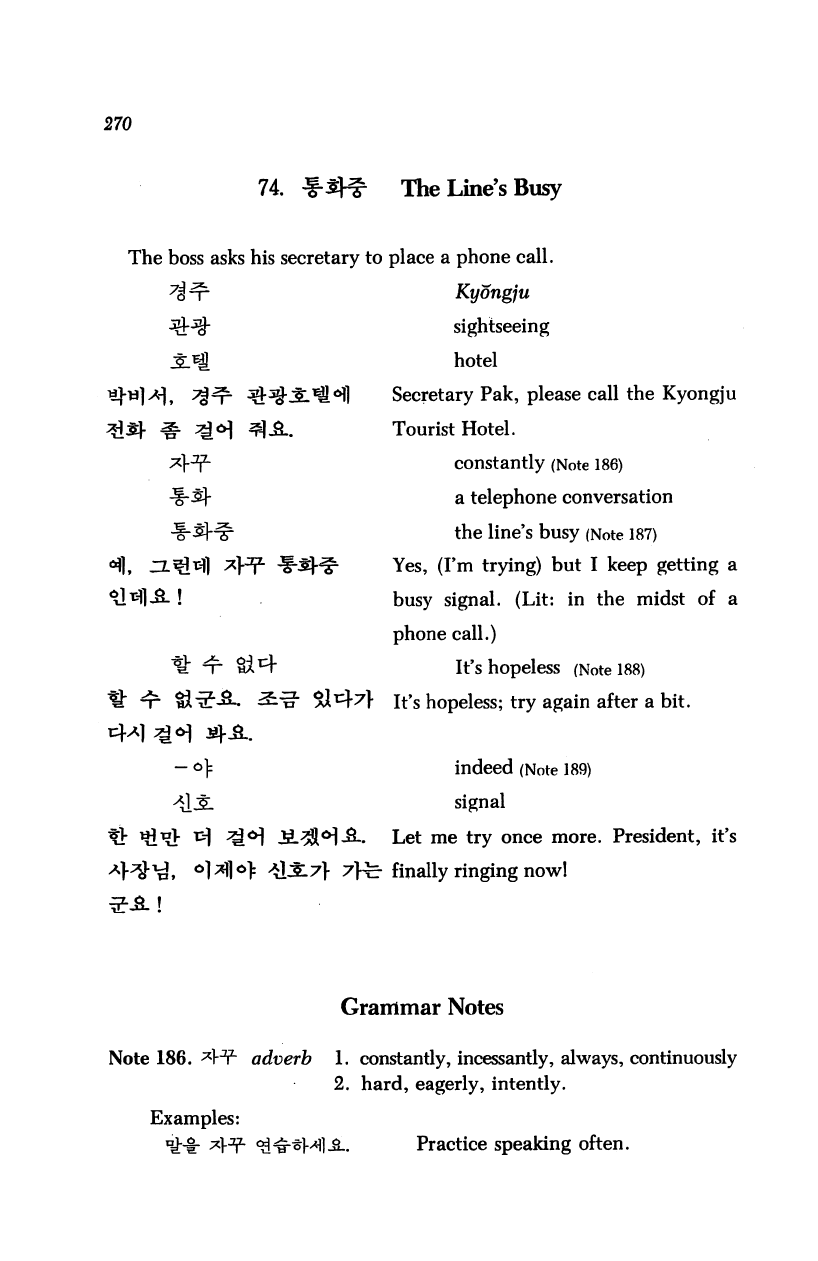
270
74.
f-3^
The
Line's
Busy
The
boss
asks
his
secretary
to
place
a
phone
call.
Kyongju
sightseeing
hotel
]
a),
7%^-
^^-Jl^^l
Secretary
Pak,
please
call
the
Kyongju
Tourist
Hotel.
constantly
(Note
186)
a
telephone
conversation
the
line's
busy
(Note
187)
«flf
Zl^^]
^H1"
^i-^r^
Yes,
(I'm
trying)
but
I
keep
getting
a
^
busy
signal.
(Lit:
in
the
midst
of
a
phone
call.)
It's
hopeless
(Note
188)
It's
hopeless;
try
again
after
a
bit.
^
A.
1=
indeed
(Note
189)
signal
Let
me
try
once
more.
President,
it's
,
ol*fl°>
^31^}
7>fe
finally
ringing
now!
Grammar
Notes
Note
186.
^H1-
adverb
1.
constantly,
incessantly,
always,
continuously
2.
hard,
eagerly,
intently.
Examples:
Practice
speaking
often.
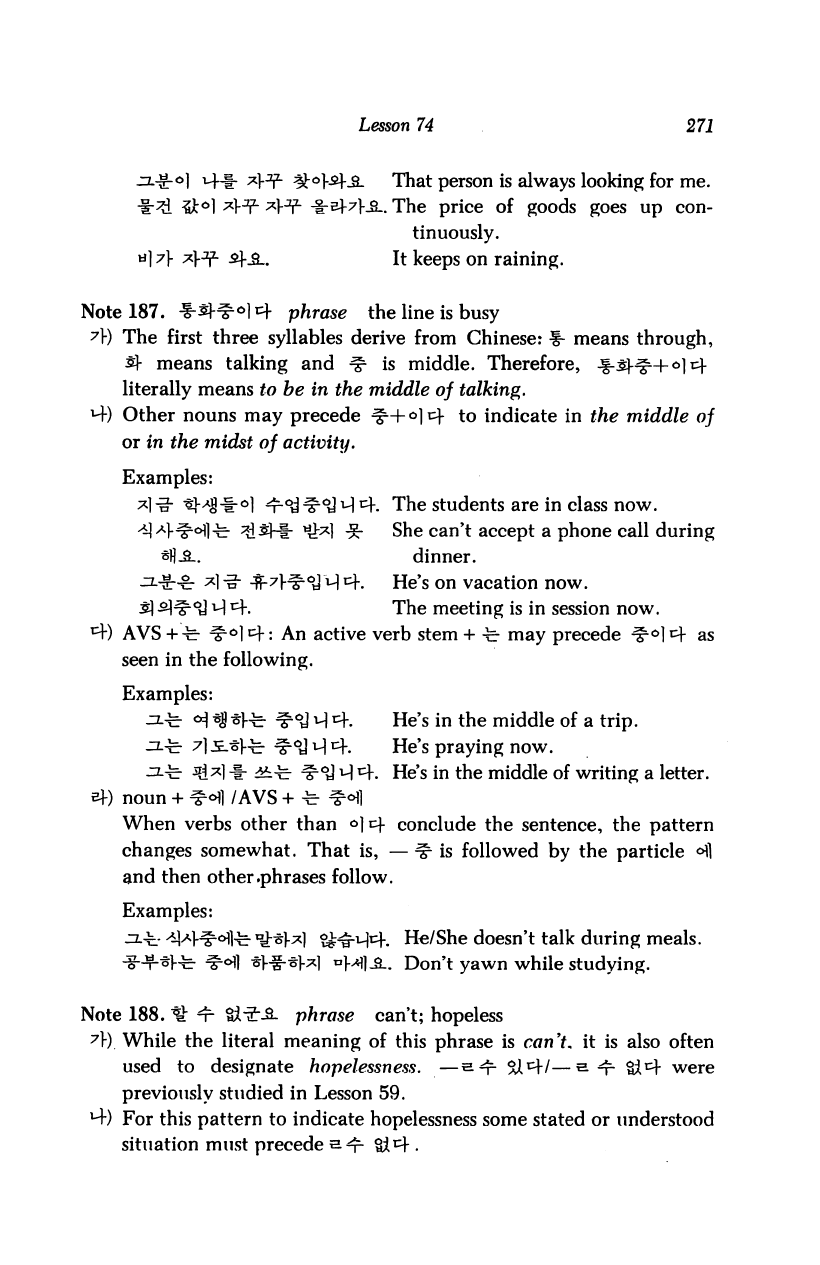
Lesson
74
271
That
person
is
always
looking
for
me.
%ko]
A^
A3^
-i-e+7l-_a..
The
price
of
goods
goes
up
con
tinuously.
A
A^
-S+-3-.
It
keeps
on
raining.
Note
187.
-f-s^
°1
A
phrase
the
line
is
busy
A)
The
first
three
syllables
derive
from
Chinese:
f-
means
through,
s}-
means
talking
and
^
is
middle.
Therefore,
Jf-j-HgH-o]
tf
literally
means
to
be
in
the
middle
of
talking.
*4)
Other
nouns
may
precede
^+°1^-
to
indicate
in
the
middle
of
or
in
the
midst
of
activity.
Examples:
The
students
are
in
class
now.
She
can't
accept
a
phone
call
during
dinner.
He's
on
vacation
now.
The
meeting
is
in
session
now.
AVS
+-c-
^°1
*\:
An
active
verb
stem
+
-fe-
may
precede
^°]
A
as
seen
in
the
following.
Examples:
oJ
^
4.
He's
in
the
middle
of
a
trip.
<y
q
tf.
He's
praying
now.
^."c-
3i*l
-t-
4t-fe-
^°J
M
4.
He's
in
the
middle
of
writing
a
letter,
noun
+
^ofl
/AVS +
-fe
^<Hl
When
verbs
other
than
6]4
conclude
the
sentence,
the
pattern
changes
somewhat.
That
is,
—
^
is
followed
by
the
particle
<^1
and
then
other
.phrases
follow.
Examples:
jit
^V^ofl^.
*£-s)-x)
S^H^f.
He/She
doesn't
talk
during
meals.
iHr-*l"te-
^°fl
*l-i-*W
nHl-S..
Don't
yawn
while
studying.
Note
188.
*
^r
Q^S-
phrase
can't;
hopeless
7r).
While
the
literal
meaning
of
this
phrase
is
can't,
it is
also
often
used
to
designate
hopelessness.
—s^
3\t\l—s
^-
Qc\
were
previously
studied
in
Lesson
59.
M-)
For
this
pattern
to
indicate
hopelessness
some
stated
or
understood
situation
must
precede
a^
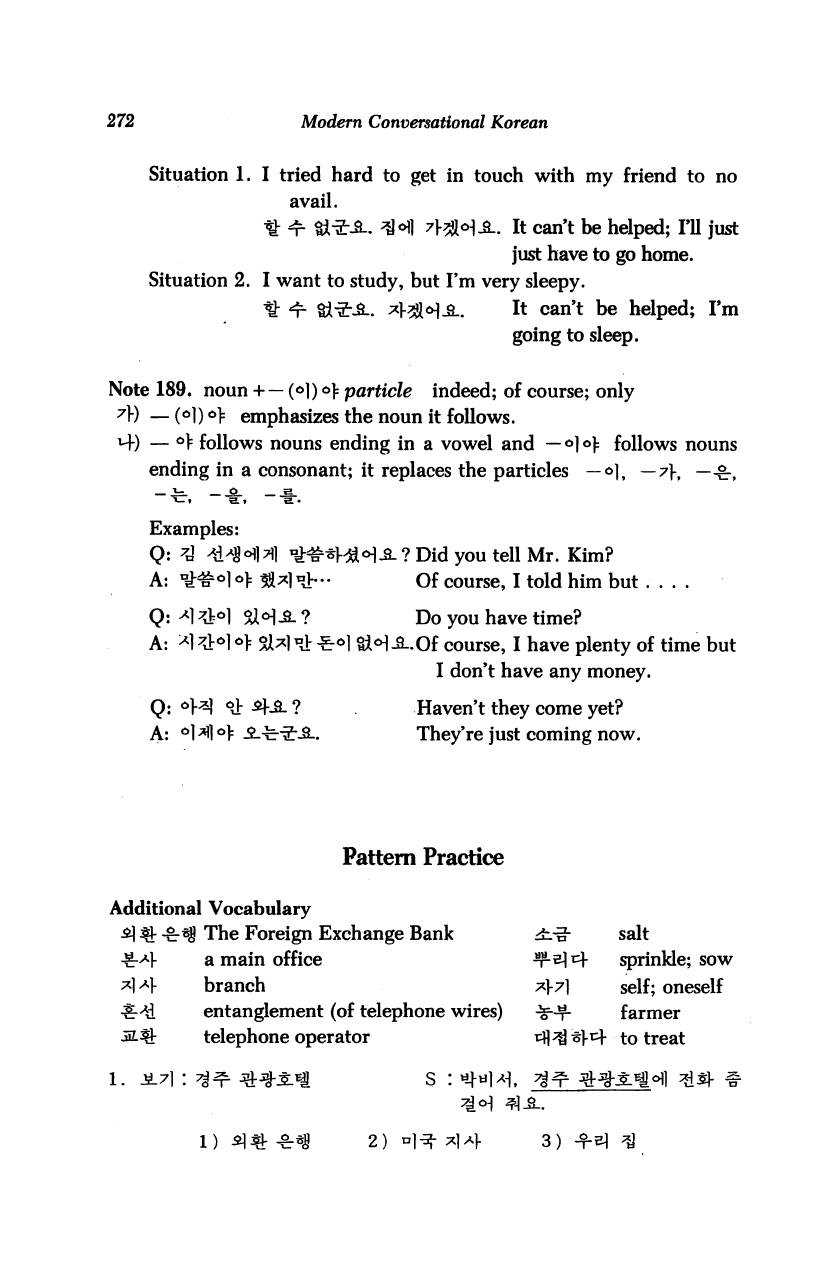
272
Modern
Conversational
Korean
Situation
1.
I
tried
hard
to
get
in
touch
with
my
friend
to
no
avail.
H:
4-
&*-£-.
3H
71-2M-SL.
It
can't
be
helped;
I'll
just
just
have
to
go
home.
Situation
2.
I
want
to
study,
but I'm
very
sleepy.
^t
*r-
§}-2"JL
*}-3MJL.
It
can't
be
helped;
I'm
going
to
sleep.
Note
189.
noun
+
—
(*])
°}
particle
indeed;
of
course;
only
7\)
—
(°1)
°>
emphasizes
the
noun
it
follows.
*+)
—
°\
follows
nouns
ending
in
a
vowel
and
—
<=>]
°\
follows
nouns
ending
in
a
consonant;
it
replaces
the
particles
—
o]f
—
7f,
—^,
Examples:
Q:
7A
'SMMXI
^#3
A:
n^&olo>
581^1
*••
Q:
^l^l
SZ<H-^-?
A:
^l^Jr^ol:^!^^
Q:
°}^
<&
-^-^-
?
A:
°1^1°>
^.-c-2--SL.
m°]£-
?
Did
you
tell
Mr.
Kim?
Of
course,
I
told
him
but
....
Do
you
have
time?
o)
§}<H
JLOf
course,
I
have
plenty
of
time
but
I
don't
have
any
money.
Haven't
they
come
yet?
They're
just
coming
now.
Pattern
Practice
Additional
Vocabulary
^1
^
-€r*8
The
Foreign
Exchange
Bank
4ii
^-^1-
a
main
office
Ts
*|>M-
branch
*\?
^-^i
entanglement
(of
telephone
wires)
^
-SL^
telephone
operator
i^H
l.
jL7i:
7^^
^t^-s-^i
s
:
*-M*l,
^n
I
salt
\*\
sprinkle;
sow
1
self;
oneself
r
farmer
m^r
to
treat
2)
3)
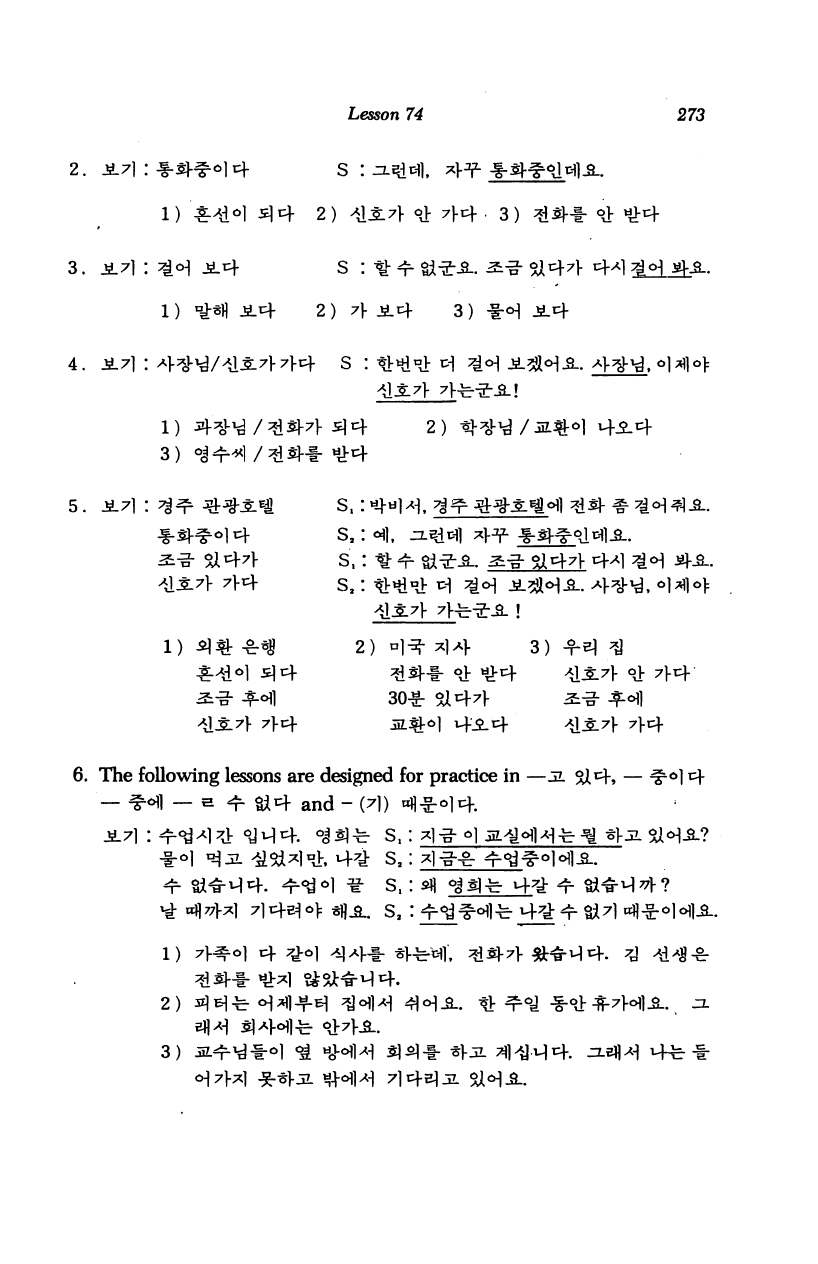
Lesson
74
273
2.
3.
4.
5.
s
:
2)
3)
s
:
2)
yy
Jt4
3)
-i-H
Ji.4
t-
s
:
l)
3)
2)
7V4
s.
:
s,
:
s,:
s,:
a-g-
SZ47V
4^1
1)
2)
ni-5}-
3)
514
7V4
6.
The
following
lessons
are
designed
for
practice
in
—jl
Si
4,
—
f^ofl
—
a
+
§i4
and
-
(7])
-5L71
:
^«a^i^
«y
w|4.
°§5i-b
s,:
*
S,:
si)
—
^"l
4
2)
3)
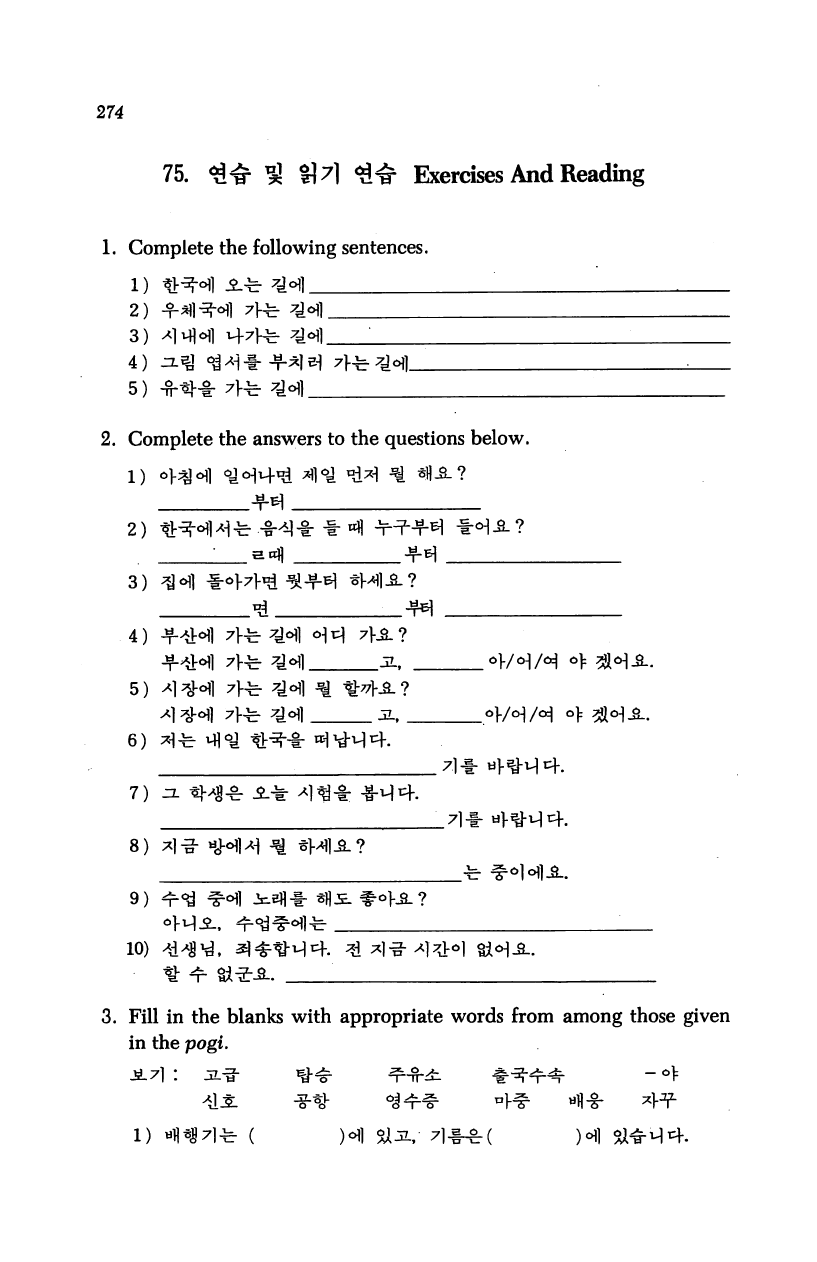
274
75.
*U£
^
H7l
<3<£
Exercises
And
Reading
1.
Complete
the
following
sentences.
1)
tJr^M
JL
2)
3)
4
)
5)
2.
Complete
the
answers
to
the
questions
below.
2)
3)
4)
-'MM
7}-fe-
*H
jl,
°W°]M
5)
'M^l
^H
6)
7)
8)
9)
3. Fill
in
the
blanks
with
appropriate
words
from
among
those
given
in
the
pogi.
Ji.7l
:
uL-i-
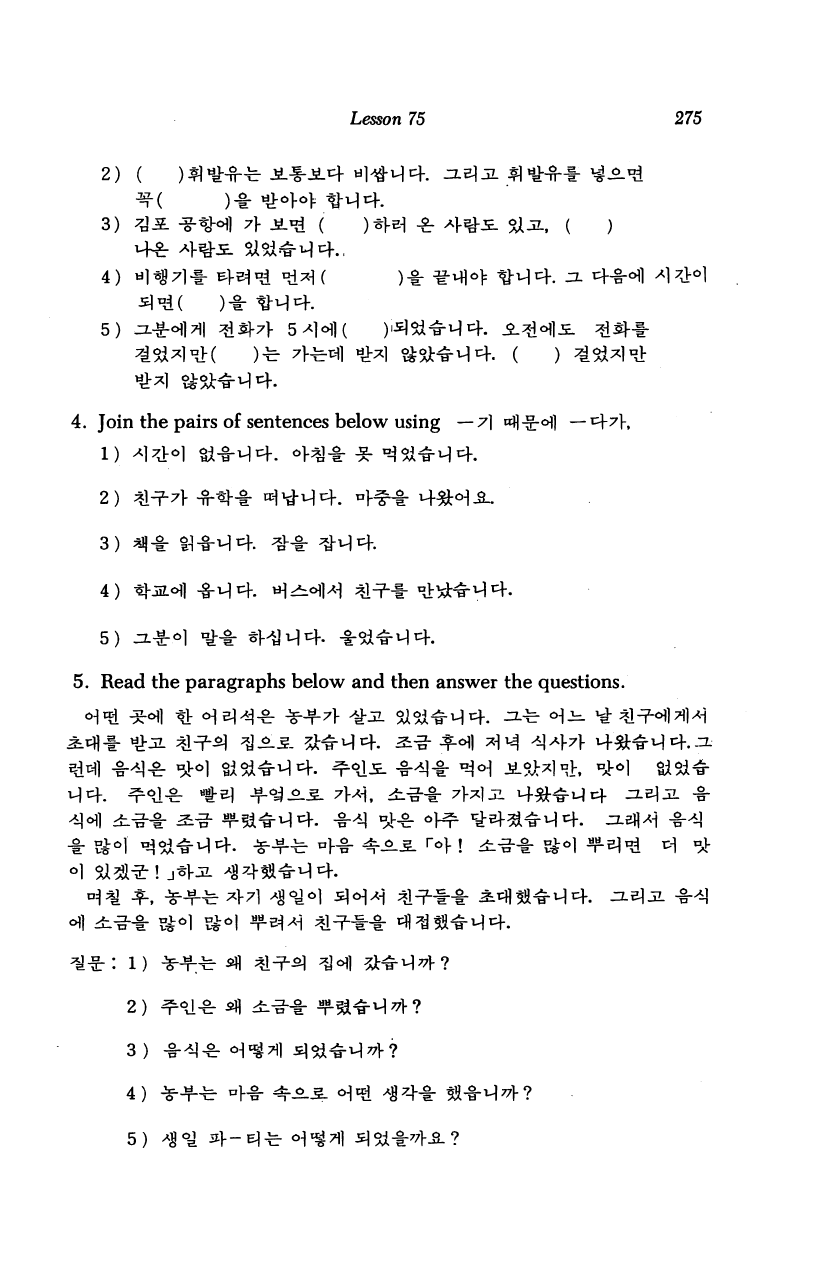
Lesson
75
275
2)
3)
4)
5)
4.
Join
the
pairs of
sentences
below
using
—7)
2)
3)
4)
41-iiLofl
5)
i-S-Pl
5.
Read
the
paragraphs
below
and
then
answer
the
questions.
2)
3)
4)
*+*■
"r*
#-5-5
5)
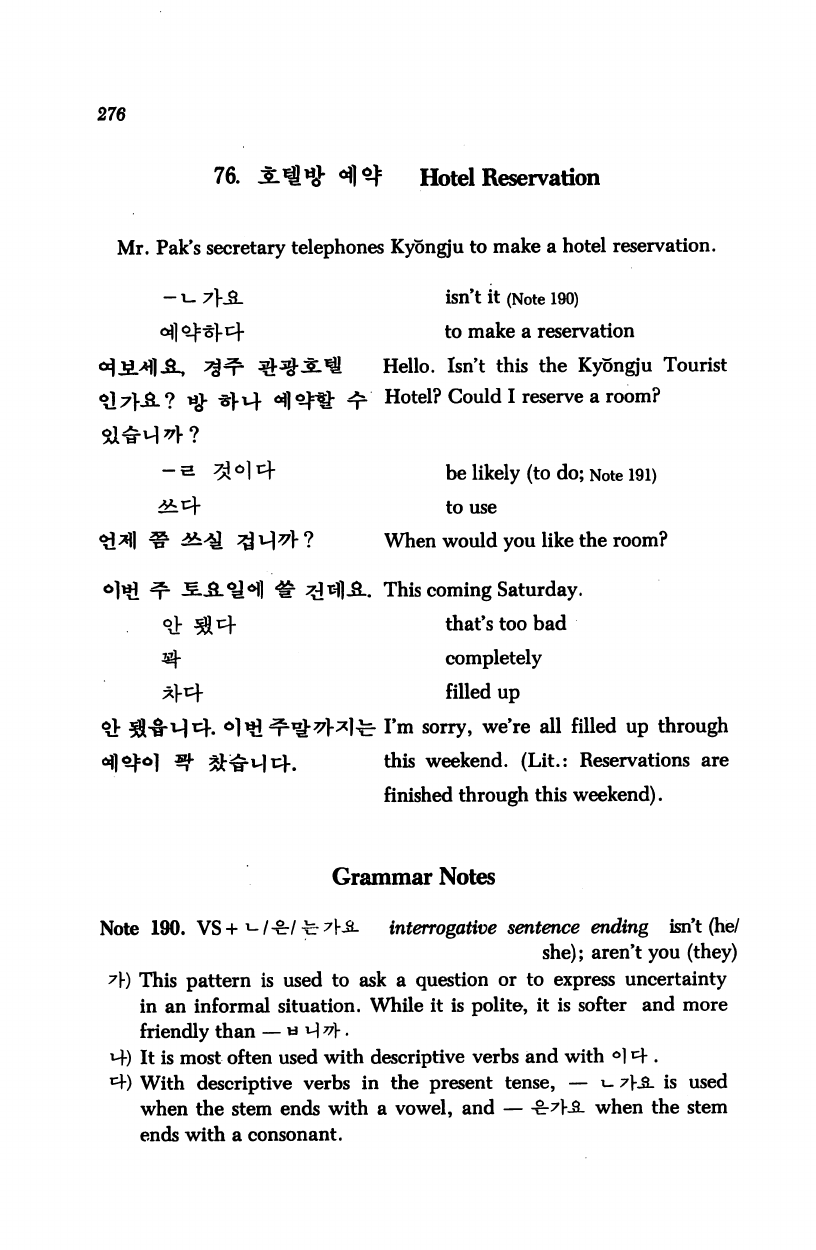
276
76.
JlW
4]^
Hotel
Reservation
Mr.
Pak's
secretary
telephones
Kyongju
to
make
a
hotel
reservation.
isn't
it
(Note
190)
to
make
a
reservation
Hello.
Isn't
this
the
Kyongju
Tourist
<il;7}-JL?
ijj-
^|-t4
^l^fJ-
^r
Hotel?
Could
I
reserve
a
room?
to
use
When
would
you
like
the
room?
This
coming
Saturday.
that's
too
bad
completely
filled
up
Tm
sorry,
we're
all
filled
up
through
39.
^^u|i4.
this
weekend.
(Lit.:
Reservations
are
finished
through
this
weekend).
Grammar
Notes
Note
190.
VS
+!-/-&-/
y:7\£-
interrogative
sentence
ending
isn't
(he/
she);
aren't
you
(they)
A)
This
pattern
is
used
to
ask
a
question
or
to
express
uncertainty
in
an
informal
situation.
While
it
is
polite,
it
is
softer
and
more
friendly
than
-«^f.
*4)
It
is
most
often
used
with
descriptive
verbs
and
with
°]
*\
.
^
With
descriptive
verbs
in
the
present
tense,
—
1-
7}£_
is
used
when
the
stem
ends
with
a
vowel,
and
—
-cr^Ka.
when
the
stem
ends
with
a
consonant.
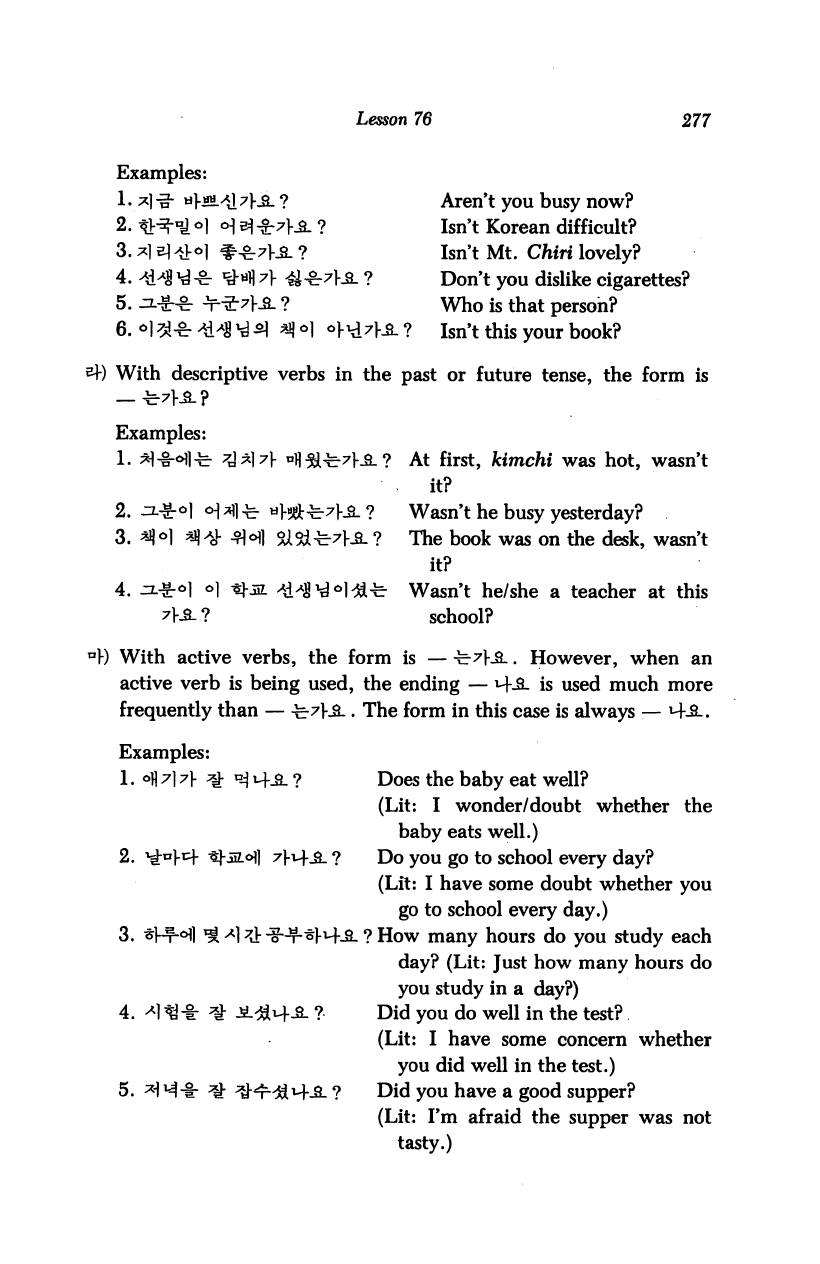
Lesson
76
277
Examples:
Aren't
you
busy
now?
2.
tV^
°]
<H
^
&7}&
?
Isn't
Korean
difficult?
3.*1
el*H
^-g^Hs.
?
Isn't
Mt.
Chin
lovely?
4.
>$H
^-8r
iM
7>
<££^7ka_
?
Don't
you
dislike
cigarettes?
5.
.n.-g-S-
Jr"2r7J-_2_
?
Who
is
that
person?
6.
°l
3}-8r
-*i^8
^
*J)
°]
ol-^Ha.
?
Isn't
this
your
book?
With
descriptive
verbs
in
the
past
or
future
tense,
the
form
is
Examples:
1.
*1-§-*fi^
^^}7\
ufl^7}-iL?
At
first,
kimchi
was
hot,
wasn't
it?
2.
Ji-gr^l
<H*fl-b
«W^-7|-^.
?
Wasn't
he
busy
yesterday?
3.
*J|°]
^
3H
SXSX^JL
?
The
book
was
on
the
desk,
wasn't
it?
4.
Ji-g-oi
*1
*±m
^d^^^l^l^
Wasn't
he/she
a
teacher
at
this
school?
UY)
With
active verbs,
the
form
is
—
^-7)-iL.
However,
when
an
active
verb
is
being
used,
the
ending
—
M-.S.
is
used
much
more
frequently
than
—
-b7fJL.
The
form
in
this
case
is
always
:—
M-A.
Examples:
1.
°fl
A
7\
^
UA
H--SL
?
Does
the
baby
eat
well?
(Lit:
I
wonder/doubt
whether
the
baby
eats
well.)
2.
^}^r
-&tM°\]
7fi4_a_
?
Do
you
go
to
school
every
day?
(Lit:
I
have
some
doubt
whether
you
go
to
school
every
day.)
3.
^l-f-ofl
^
<*]
7^
f-f^tfi.
?
How
many
hours
do
you
study
each
day?
(Lit:
Just
how
many
hours
do
you
study
in
a
day?)
4.
-*1
^-i:
^
^.^14^.
?
Did
you
do
well
in
the
test?
(Lit:
I
have
some
concern
whether
you
did
well
in
the
test.)
5.
*\
^-t-
^
^^r-^M-^L
?
Did
you
have
a
good
supper?
(Lit:
I'm
afraid
the
supper
was
not
tasty.)
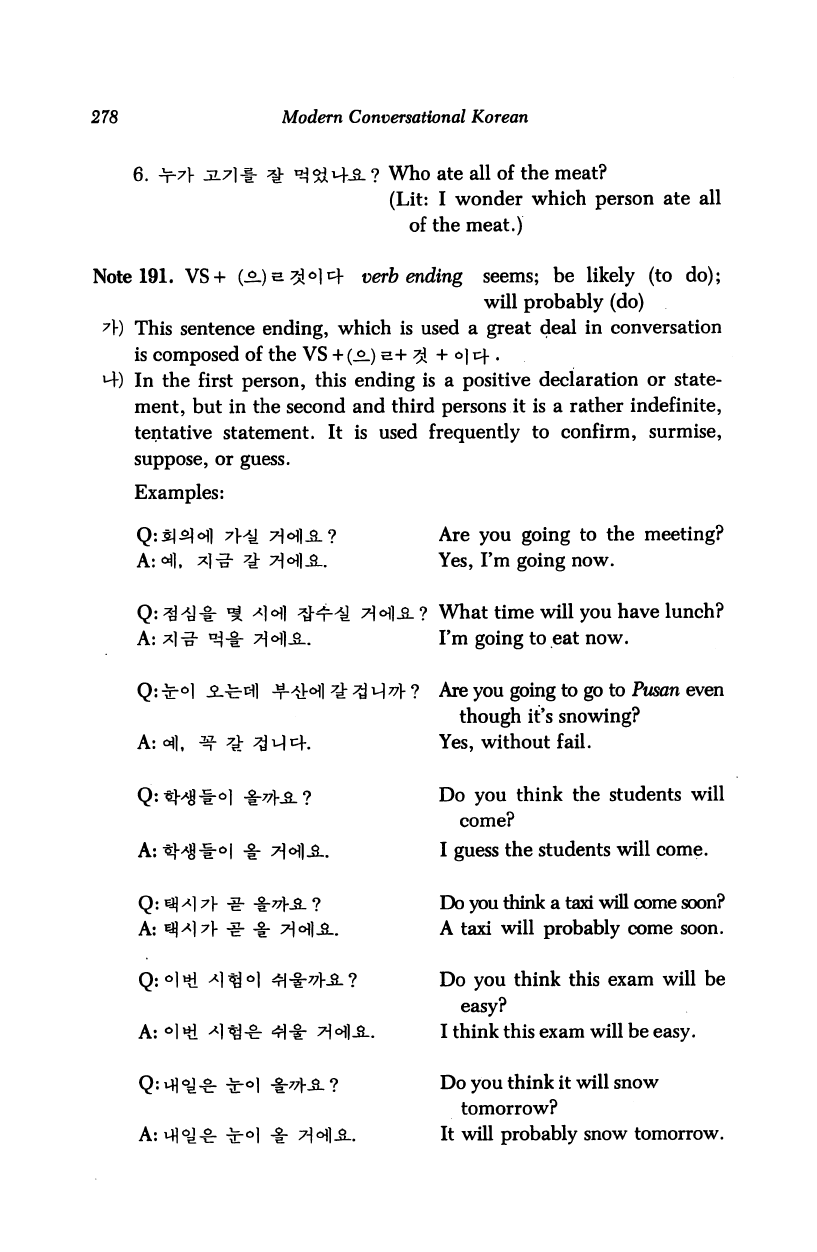
278
Modern
Conversational
Korean
6.
±r7}
JL71-I-
*£
^&M-SL
?
Who
ate
all
of
the
meat?
(Lit:
I
wonder
which
person
ate
all
of
the
meat.)
Note
191.
VS
+
(^.)e^o|i4
verb
ending
seems;
be
likely
(to
do);
will
probably
(do)
A)
This
sentence
ending,
which
is
used
a
great
deal
in
conversation
is
composed
of
the
VS
+
(s.)
e+
^
+
°]
r+
.
*4)
In
the
first
person,
this
ending
is
a
positive
declaration
or
state
ment,
but
in
the
second
and
third
persons
it
is
a
rather
indefinite,
tentative
statement.
It
is
used
frequently
to
confirm,
surmise,
suppose, or
guess.
Examples:
H)
7Hl_gL?
Are
you
going
to
the
meeting?
A:
<A],
*]-?
7J:
7-H.Sl.
Yes,
I'm
going
now.
A:
*l-g-
«
A:<^1.
^
sj-i-
7H-8-.
-
z}-
^v|cf.
A:«M|-i
Q:
iy)
^]
7J-
-g-
-§-?7|-_S-
?
A:
^^l^l-
^-
-§-
^<H]^..
A:°l«ti
-
A:
m°J-8
*lfl*
4=1-1-
TfoflJ
:
T°l
-I"
7-H-S-.
A]°3i]
^Hr-iJ
tHI-3-?
What
time
will
you
have
lunch?
Fm
going
to
eat
now.
?$
i-|
v\
?
Are
you
going
to
go
to
Pusan
even
though
it's
snowing?
Yes,
without
fail.
Do
you
think
the
students
will
come?
I
guess
the
students
will
come.
Do
you
think
a
taxi
will
come
soon?
A
taxi
will
probably
come
soon.
Do
you
think
this
exam
will
be
easy?
I
think
this
exam
will
be
easy.
Do
you
think
it
will
snow
tomorrow?
It
will
probably
snow
tomorrow.
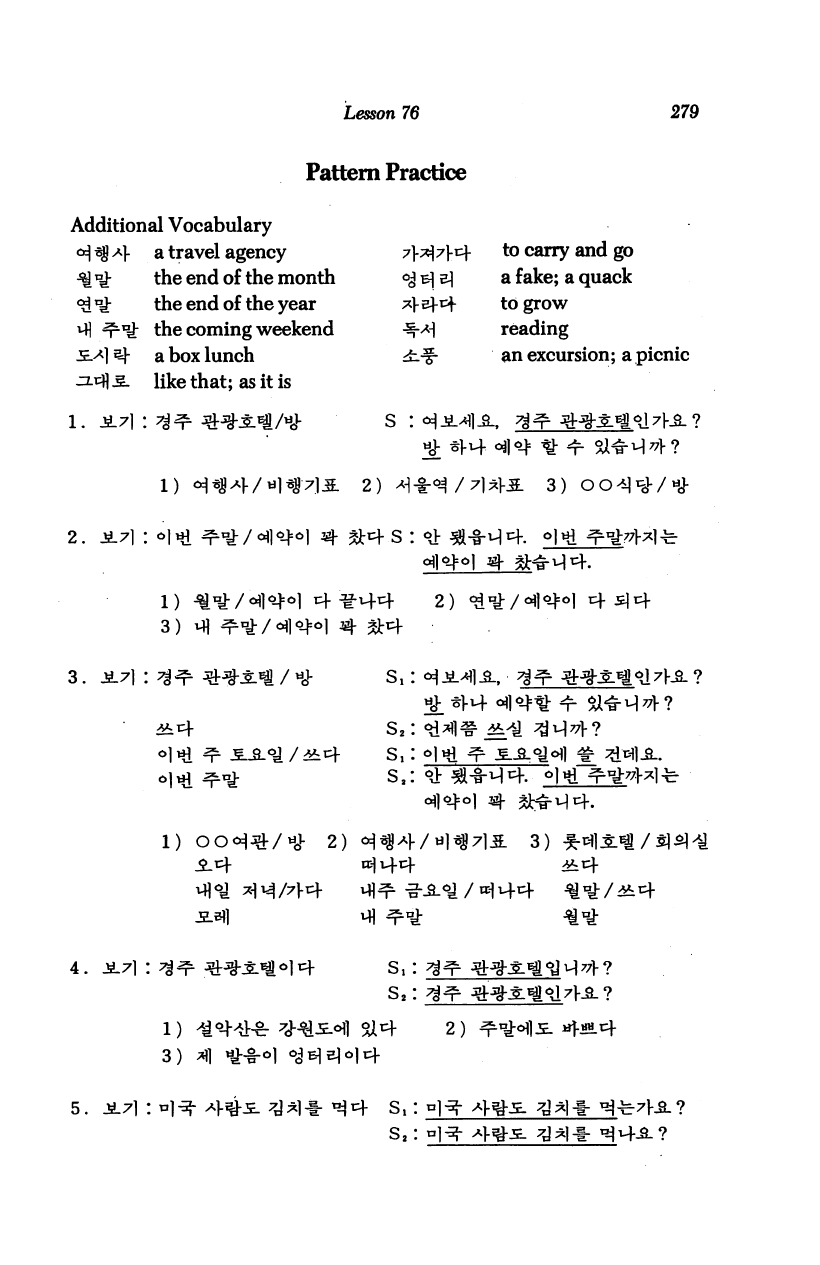
Lesson
76
279
Pattern
Practice
Additional
Vocabulary
Af
a
travel
agency
the
end
of
the
month
the
end
of
the year
LI£
the
coming
weekend
a
box
lunch
like
that;
as
it is
l)
to
carry
and
go
<^
b]
e)
a
fake;
a
quack
to
grow
reading
an
excursion;
a
picnic
s
:
2)
3)
2.
3)
3.
jt7|:
l)
/
hJ-
2)
2)
s,
:
S,:
s,:
s,:
3)
1)
3)
S,:
s2:
si
4
2)
s,:
s2:
